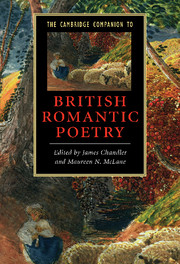Book contents
- Frontmatter
- Introduction: The companionable forms of Romantic poetry
- 1 The living pantheon of poets in 1820: pantheon or canon?
- 2 Romantic poetry and antiquity
- 3 Romantic meter and form
- 4 Romantic poetry and the standardization of English
- 5 Thinking in verse
- 6 Romantic poetry and the romantic novel
- 7 Wordsworth’s great Ode: Romanticism and the progress of poetry
- 8 Romantic poetry, sexuality, gender
- 9 Poetry, peripheries and empire
- 10 Romantic poetry and the science of nostalgia
- 11 Rethinking Romantic poetry and history: lyric resistance, lyric seduction
- 12 The medium of Romantic poetry
- 13 Romantic poets and contemporary poetry
- Index
- Series List
10 - Romantic poetry and the science of nostalgia
Published online by Cambridge University Press: 28 November 2008
- Frontmatter
- Introduction: The companionable forms of Romantic poetry
- 1 The living pantheon of poets in 1820: pantheon or canon?
- 2 Romantic poetry and antiquity
- 3 Romantic meter and form
- 4 Romantic poetry and the standardization of English
- 5 Thinking in verse
- 6 Romantic poetry and the romantic novel
- 7 Wordsworth’s great Ode: Romanticism and the progress of poetry
- 8 Romantic poetry, sexuality, gender
- 9 Poetry, peripheries and empire
- 10 Romantic poetry and the science of nostalgia
- 11 Rethinking Romantic poetry and history: lyric resistance, lyric seduction
- 12 The medium of Romantic poetry
- 13 Romantic poets and contemporary poetry
- Index
- Series List
Summary
For the Reader cannot be too often reminded that Poetry is passion: it is the history or science of feelings.
William Wordsworth, Note on “The Thorn”Introduction
For better or worse, Romanticism and nostalgia are so frequently associated as to be nearly synonymous. An influential account of Romantic thought across Europe once characterized the movement by its “nostalgia for the natural object, expanding to become nostalgia for the origin of this object,” and the longing for nature is but one of many returns associated with the period. These include, in addition, the retrieval of romance modes, the renewed interest or imaginative investment in national and cultural pasts, the turn from polite culture to the “very language of men” - at times conjoined with a full-scale retreat from the anonymity of print culture and its potentially hostile public - and the reanimation of oral cultures and orality, even when, or perhaps especially when, the bards were inauthentic and technologically mediated.
The implicit or explicit understanding of nostalgia in each case casts the phenomenon as a distancing, even a falsification, of the pressing realities of modernity: urbanization, the vexed national politics within a newly but uneasily united kingdom of Britain, the equally if not more vexed international politics, warfare and colonial endeavors, print technology and the marketplace. This is the nostalgia familiar in common parlance today - the sentimental and safe retrospect, the pleasing melancholy, the whitewashing of less lovable aspects of history, past and present alike. Susan Stewart thus writes that nostalgia testifies to “a longing that of necessity is inauthentic . . . because the past it seeks has never existed except in narrative.” The nostalgic, she writes, “is enamored of distance, not of the referent itself.” Nostalgia, writes one critic of postmodernity, “exiles us from the present as it brings the imagined past near”; another, Fredric Jameson, argues that nostalgia, so construed, is “an elaborated symptom of the waning of our historicity, of our lived possibility of experiencing history in some active way.”
- Type
- Chapter
- Information
- The Cambridge Companion to British Romantic Poetry , pp. 195 - 216Publisher: Cambridge University PressPrint publication year: 2008
- 18
- Cited by



